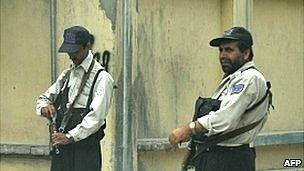Afghan security contractors 'fund Taliban'
- Published

Private security guards are often used to guard compounds or convoys
Heavy US reliance on private security in Afghanistan has helped to line the pockets of the Taliban, a US Senate report says.
The study by the Senate Armed Services Committee, external says this is because contractors often fail to vet local recruits and end up hiring warlords.
The report demands "immediate and aggressive steps" to improve the vetting and oversight process.
Some 26,000 private security personnel, mostly Afghans, operate in Afghanistan.
Nine out of 10 of them work for the US government.
Private security firms in Afghanistan provide guards for everything from diplomatic missions and aid agencies to supply convoys.
In August, Afghan President Hamid Karzai gave private security companies four months to end operations in Afghanistan.
'Mr White'
"All too often our reliance on private security contractors in Afghanistan has empowered warlords, powerbrokers operating outside Afghan government control," Democratic Senator Carl Levin, chairman of the Senate committee, said.
"These contractors threaten the security of our troops and risk the success of our mission," he added.
The report found that some contractors have had little training, while others were warlords linked to "murder, kidnapping, bribery and anti-coalition activities".
The document gives several notorious examples, including a man the Americans nicknamed Mr White - after a character in the violent film Reservoir Dogs - and his two brothers.
Mr White, who was hired to help guard Shindand airbase in the western Afghan province of Herat, was killed in 2007 by a rival Afghan security contractor.
The Americans then employed his brother, who was known as Mr White II. He is suspected of having funded the insurgents, and was eventually killed in a US raid on a Taliban meeting.
Mr White II's brother, known as Mr White III, was then appointed to provide security, and was kept on the payroll despite concerns linking him to a wave of roadside bombs in the area.
The report also says that by funding warlords with their own private militias the US is undermining its declared aim of creating a more stable Afghanistan.
Hard choices
It warns that the growth of a lucrative private security industry has drawn new recruits away from the Afghan police and army, where salaries are lower.
In response to the report, Doug Brooks, the president of a body that represents private security contractors, said contractors in the field faced hard choices regarding whom to employ.
"If your option is either using the local nationals who may be working for a local headman or warlord, or importing somebody from another part of Afghanistan - which automatically makes them a target - you may not have a whole lot of choice," he told the BBC's World Today programme.
The latest report follows July's Congressional inquiry, which said that trucking contractors paid tens of millions of dollars a year to local warlords for convoy protection.
In recent months, US forces in Afghanistan have pledged to increase their oversight of security contractors and set up task forces to track the money spent among sub-contractors.